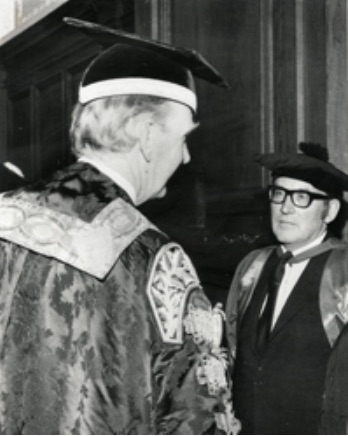1972 - Maurice Vincent Wilkes

Professor M.V. Wilkes, F.R.S., with His
Grace the Duke of Northumberland

Professor M.V. Wilkes, F.R.S., with His
Grace the Duke of Northumberland
Mr. Chancellor,
Francis Bacon gave it as his opinion that, 'Histories make men wise; poets, witty; the mathematics subtle'; he went on to add, 'logic and rhetoric [make men] able to contend'. Maurice Wilkes wisely read Mathematics at Cambridge but, as though subtlety were not enough, he developed and applied the clear logic of the computer and has demonstrated by the spectacular growth of the Computing Laboratory of Cambridge, which he heads, his clear ability 'to contend'.
Maurice Wilkes first joined the Mathematical Laboratory, as it was then called, in 1937. The war intervened, however, and he worked on radar and operational research between 1939 and 1945. At one time he was responsible for the construction of a radar station on an island in the Firth of Forth. A team of men had to land various items of equipment on the island and it was necessary to wait until the tide was right. The exercise had been critically and scientifically planned. As was to be expected the tide came right late on Saturday night, but by then his men had succumbed to the hospitality of the Edinburgh hostelries and the most critical path of all became a random walk: the expedition had to be postponed. From this experience Dr. Wilkes no doubt learned that when dealing with ordinary mortals, subtlety is not enough.
Maurice Wilkes' wartime experience of radar and its associated electronic techniques helped him when he returned to Cambridge after the war to design and build EDSAC which was the first stored programme digital computer to work in Britain. Wilkes was one of the first people to foresee that the programmes for a computer or 'software' were going to be of tremendous importance, and his book on programming for the digital computer was one of the first in the field. He went on to develop ways of getting the computer to do some of the administration and bookkeeping operations for the programmer instead of requiring the human to do them himself. All this work was done on EDSAC, a machine which embodied racks and racks of valves. The overall reliability of the system was in part due to the thick layers of dust which settled on the valves in their open racks and aided the continuity of the electrical connections. When the dust was vacuumed away by a zealous research worker the machine took a couple of years to recover. The research worker in question has since ensured that others do any dusting that is necessary. This particular machine had the added anthropomorphic attraction, not shared by today's microminiaturised solid state systems, of being able to play in a quavering tone when suitably programmed, 'Pop goes the weasel' and other tunes.
More recently Wilkes has been involved in studies of time sharing systems and the associated problems of security of information. He has, however, warily not involved himself in the headier possibilities conferred by access to a large computer. The mediaeval philosophers' speculation as to how many angels might be conveniently accommodated on the point of a needle could presumably be determined in a nanosecond or so. Such moral philosophizing would however be, to requote Francis Bacon, 'grave' and even dangerous. As Alexander Pope remarks,
See Mystery to Mathematics Fly! In vain! they gaze, turn giddy, rave and die.Recently Maurice Wilkes has made a detailed study of the sketchbooks and plans left by Charles Babbage, father of the computer, the centenary of whose death was celebrated last year. Babbage wrote,
If, unwarned by my example, any man shall undertake and shall succeed in really constructing an engine embodying in itself the whole of the executive department of mathematical analysis upon different principles or by simpler mechanical means I have no fear of leaving my reputation in his charge.There is no doubt that Babbage's reputation is secure in the hands of Maurice Wilkes, who will continue to advance the science and technology of computing. The success of the Cambridge Laboratory is a tribute to the unflamboyant persistence of a dedicated scholar. Mr. Chancellor, I present to you Maurice Wilkes, mathematician, physicist, computer scientist and university politician and ask you to confer upon him the degree of Doctor of Science, honoris causa.
Dr. Ian Fells